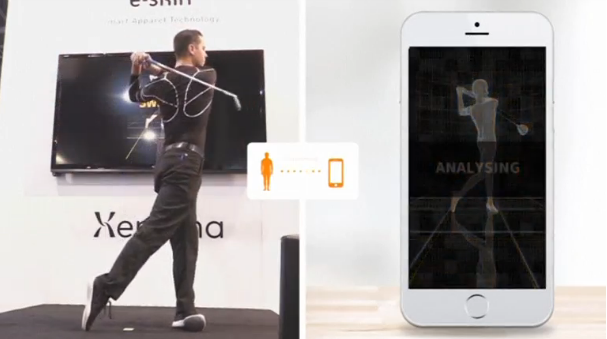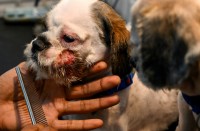
BERLIN, Germany (Reuters) — A spin-off company from the University of Tokyo has developed a motion and health tracking wearable technology with stretchable wires and sensors embedded onto traditional textiles. Dubbed “e-skin”, the makers say it can withstand high strain rates when subjected to the wearer’s repeated and extreme movements, making it ideal as ‘smart’ sportswear.
So-called ‘smart clothing’ has been developed by a number of companies, most notably luxury brand Ralph Lauren with its PoloTech smartshirt.
But developer Xenoma says they pack much more technology into their shirt and were the first company to develop the Printed Circuit Fabric (PCF) technology that makes the e-skin comfortable to wear and able to withstand the rigours of extreme body motion.
“We are monitoring the deformation of the shirt caused by body motion,” said Ichiro Amimori, co-founder of Xenoma, adding that 14 sensors are positioned on the shirt at strategic places, including on the shoulders, elbows and wrists.
Thin and stretchable wires connect the sensors to a chest-mounted hub, said Amimori.
“In here we have a battery, micro-computer, motion sensor and Bluetooth. And the data is sent via Bluetooth to the PC and smart phone, and then we can know everything, anywhere, any place.”
The PCF technology can also integrate sensors to monitor temperature and the amount of oxygen in the blood, and contains an electrocardiogram (ECG) and accelerometer.
The e-skin is machine washable and robust, says Amimori, with the garment stretch-tested at more than 10,000 times with a 50 percent strain rate.
In February the company launched an e-skin developer’s kit that supports app creation on several platforms, including Windows and Android. Xenoma says most initial interest has come from the gaming sector where the e-skin’s gesture-tracking can make games’ characters perform movements like running, jumping and punching. They’re also developing sports applications for e-skin, including an app that assesses golf swing and suggests improvements.
The researchers are now working on a similar outfit to monitor the health of infants.
“We’ll be monitoring the body temperature, motion and blood pulse. So parents can monitor everywhere, anytime with just having a smart phone,” said Amimori.
He added that the e-skin for babies will be unveiled at the Consumer Electronics Shows (CES) in Las Vegas in January 2018.







